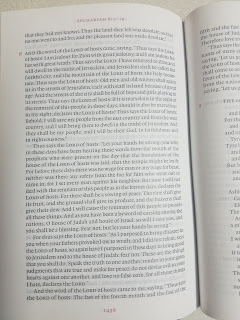"Well
done, good and faithful servant. You have been faithful over a little; I will
set you over much. Enter into the joy of your master."
That first phrase, "Well
done, good and faithful servant" is one that many Christians
anticipate hearing from the Lord on that day when we come into his very
presence. Hearing those words from our Savior would mean that after we came to
have faith in him we did well in serving him with whatever gifts he
happened to give us. Hearing those words would mean that we saw our lives as
devoted to his service, trusted by him to use his gifts wisely and for his
glory.
To which I say "Amen!" We serve God not to earn
his grace but out
of thankfulness for receiving his grace. But being a servant of Jesus is
not always an easy thing. Being a "good
and faithful servant" can be downright difficult, almost impossible,
at times.
That was the thought going through my head last night, when
I went outside with my bandana around my face because of the COVID-19 guidelines. Someone had rung the doorbell at
the parsonage and I went outside to talk with him. It was his second visit in
three days, and those were the first times I had seen this man since last
summer, when he was here a number of times. We had a good conversation the other day. I was able to pray with him
and send him off with a meal. Last night was a bit different. He was
intoxicated and as we talked I could see that the conversation wasn't going to
be heading anywhere that would be constructive.
For better or worse, these kinds of things are a recurring
aspect of ministry on the reservation. I have conversations with this man, and
a number of other people I've gotten to know on the reservation, that are all
over the place. Sometimes they are good but far too often I don't seem to be
doing anything beyond simply maintaining a relationship with them, and hoping
that the next time our paths cross it will be different. Would Jesus look on my
interaction last night and say "Well
done, good and faithful servant"? I'm wasn't sure.
Thinking about last night's situation today I am reminded
that God gives the gifts, we use them to the best of our ability, and he
brings forth the increase. In Galatians 5 we are reminded of a number of
the fruits
of the Holy Spirit that are active in the lives of Christians. Looking at
that list in view of last night I can see that peace, patience, kindness,
faithfulness and self-control seemed to be present, to me, in my part of the
interaction. And in that light perhaps there was more going on last night than
I had first thought.
The Christian life is a marvelous blessing but living
day-by-day as a believer in the Lord Jesus can be very difficult at times. We
are all going to have moments when serving the Lord well will be a very real
challenge. I have struggles. You'll have them too. I think that the only thing about my experience that may
be somewhat unique are the particular details.
May you live by faith, knowing that in the end it is the
faithfulness of Jesus that is victorious. Well done, good and
faithful servant? I'm going to try to continue serving as faithfully as I can,
and leave the rest to him.
Scripture quotations
are from The Holy Bible, English Standard Version® (ESV®), copyright © 2001 by
Crossway, a publishing ministry of Good News Publishers. Used by permission. All
rights reserved.







